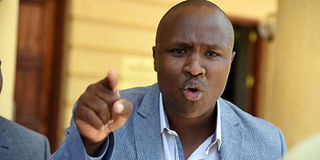Bill seeks cover for cancer, heart and kidney patients

Nandi Hills MP Alfred Keter. He has proposed a bill which seeks to create a national medical fund to fully finance the treatment of chronic diseases. PHOTO | FILE | NATION MEDIA GROUP
What you need to know:
- The Medical Fund Bill seeks to create a national medical fund to fully finance the treatment of chronic diseases.
- According to Mr Keter, the bill should not be confused with the NHIF Act, which provides medical insurance to all diseases.
- About 40,000 cases of critical ailments are reported annually, with a number of Kenyans spending millions of shillings abroad for treatment.
It will be mandatory for the government to cater for specialised treatment of cancer, heart and kidney patients if MPs approve a bill proposed by Nandi Hills MP Alfred Keter.
The Medical Fund Bill seeks to create a national medical fund to fully finance the treatment of chronic diseases, especially for patients who cannot afford the cost of medical care.
The bill is currently before the Budget and Appropriations Committee for consideration because it has a financial implication on the national budget.
According to Mr Keter, the bill should not be confused with the NHIF Act, which provides medical insurance to all diseases.
He said the bill seeks to categorise the three life-threatening diseases under State care.
FINANCING TREATMENT
“Whereas NHIF has a limit in terms of financing treatment of the critical diseases, what I am proposing is to make it mandatory for the government to pay for all the expenses of cancer, kidney and heart patients,” said Mr Keter.
However, the Budget Committee chaired by Kikuyu MP Kimani Ichung’wah will have the final say on the bill in terms of whether it will be possible for the government to finance it.
“This is a step towards universal healthcare, which is one of President Kenyatta’s Big Four agendas,” he said.
About 40,000 cases of critical ailments are reported annually, with a number of Kenyans spending millions of shillings abroad for treatment.
MOBILISING FUNDS
Mr Keter’s proposal is heavily borrowed from the South Korea model whose single-payer programme has been successful in mobilising funds for the entire population.
According to fiscal analysts in the Parliamentary Budget Office, who appeared before the House Budget committee yesterday, Sh2 billion is required to finance the board to manage the medical fund.
About Sh250 billion in Exchequer support, grants and loans has been invested in public health financing both at the national and county government levels.
Under the NHIF package, patients in need of chemotherapy get a cover of Sh25,000 per session while those in need of radiotherapy get Sh18,000. NHIF also provides a cover of Sh8,000 for CT scan and Sh15,000 for MRI.
NON-COMMUNICABLE DISEASES
Patients with cancer and other non-communicable diseases are provided with a cover of Sh5,000 for monthly clinic check-ups.
The expenses are quite beyond those with no formal employment.
NHIF card holders also have Sh500, 000 cover for basic heart procedures and surgery as well as kidney treatment and Sh10, 000 per dialysis session.
But with a majority of Kenyans not members of NHIF, affording the treatment cost is beyond them.
The limit of Sh800, 000 per year for NHIF card holders is also another challenge considering that the treatment costs in millions.
Members of the public, who are not employed contribute Sh500 to NHIF in personal cover, meaning that it takes 1600 Kenyans to contribute to a patient, which is not even enough.
The poor, who cannot afford even an air ticket are forced to do with the local care.





